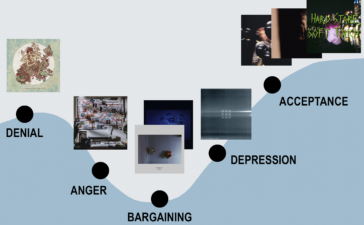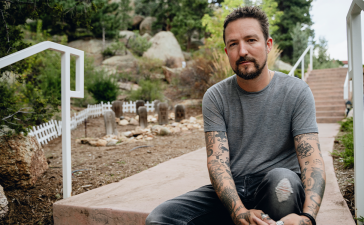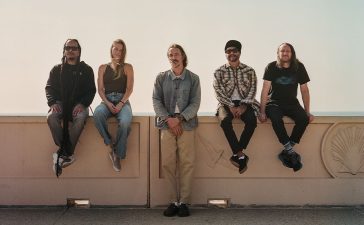We owe a lot of ourselves to our upbringings. The way parents raise their children – the lessons instilled, the atmospheres exposed, the energies broadcast – will intrinsically direct the growth of their young minds. Most of us are privileged to say we had quite rosy childhoods: we went to good schools, we spent our weekends playing and we never starved. But even if it isn’t the norm, cases of the opposite are far too common.
An only child, Alex Reade – who you’d likely know best as the frontwoman for Melbourne metalcore titans Drown This City (after all, why else would you be reading this story?) – was raised in a deeply fractured, unstable family dynamic. Her parents fought constantly, their relationship fraught by their own insecurities and discomfort with who they were as people. Thus led to a callous rhythm of damage: the pressure to succeed under impractical expectations brewed stress, then failure spurred disappointment, starting fights that galvanised deep-rooted anger – rinse and repeat. Reade’s formative years came later in her teens, as all she knew in childhood was turbulence.
“It was just complete dysfunction,” Reade confides in BLUNT. “I didn’t have a support system, either – no brothers or sisters or anything like that – so I had a very lonely childhood. It definitely gave me a lot of anxiety. And I’ve carried that anxiety throughout my life without really knowing where it came from. I had to learn to self-regulate – I went through a lot of therapy and counselling, just learning to ask myself, ‘Why do I feel so unsafe? Why am I so scared? Why am I so anxious? Why am I always in pain?’”
Through counselling, Reade developed methods to isolate the root of her anger. “A lot of the time you start with anger,” she says, “Because that’s quite a protective place to be at. You can feel like you’re okay, but you’re angry – and then as you strip things away, you find the vulnerability and the pain and the softness underneath that anger.”
Long before she turned to therapy, Reade found a potent emotional outlet in music. Metal was a means to an end: the visceral sonic ferocity of blastbeats and drop D riffs allowed her to decipher her mental anguish in a tangible, yet non-destructive way. Songwriting served as a channel for Reade to reckon with what she’d deciphered. As strongly as it was a creative endeavour, Drown This City became a lifeline.
But after five years of rendering art from her trauma, Reade hit a roadblock at the start of 2020. The band were gearing up to record Colours We Won’t Know, the six-track follow-up to their breakthrough 2019 release (and UNFD debut) Alpha // Survivor. The music had long since been penned, and the studio time they’d booked was fast approaching. But Reade – who’d typically had no troubles churning out a transcendent treasury of poignant ruminations on a whim – couldn’t shake the creative fog engrossing her.
“I guess when I normally go to write a song,” she explains, “I’m thinking, ‘Alright, I want to be powerful, I want to inspire people.’ You always want the lyrics to be like, ‘Fuck you, I’m really strong!’ – but I just couldn’t do it. I had a complete mental blank. I ended up being alone in my room one night, trying to write a song and just bursting into tears because I couldn’t write what I was trying to.”
“I started writing this really sad song – it ended up being a track called ‘Gemini’, and it’s a really soft, more of an instrumental-based one with a lot of clean vocals. And when I was writing those lyrics, I came to this realisation, like, ‘Okay, I’ve got a lot of this pent-up self-doubt and self-hatred.’ I started writing from a place of genuine disgust and sadness – which I don’t normally do, I’d never written that way before. But I was in such deep pain, I needed to find a way to write from that perspective.
“In metalcore, there’s this pressure to always be like, ‘Fuck yeah, we’ve got you! Fuck the man! Fuck the people that hurt you!’ So to be writing from a place of absolute sadness, like, ‘I feel miserable, I want to die’ – y’know, that’s a really confronting place to be coming from.”
Naturally, there was some trepidation to Reade’s newfound artistic vulnerability – something that certainly wasn’t soothed when Drown This City’s recording plans were thrown into disarray. Two days before they were set to start tracking, longtime bassist and screamer Matt Bean decided to leave the fray, citing disillusion with the music industry. They also had to scramble for a new producer when Scott Simpson bowed out to prioritise touring commitments with Alpha Wolf. It was only at the last possible second the band found Toby Thomas, who incidentally was looking for a new group of shredheads to wreak havoc with.
Thomas’ input in the studio was integral to Reade embracing the idea of laying her soul bare on tape. “When you’re opening yourself up in a song,” she muses, “You’ve really gotta take yourself down into that dark place. And sometimes you’re just like, ‘Oh man, I don’t want to fucking do this.’ It’s painful. But when I went into the studio with Toby, for some reason he just totally vibed with that place. He was like, ‘Yep, I resonate with these thoughts,’ and he started helping me to write.”
The chemistry between Reade and Thomas led to Colours We Won’t Know shaping up in a much more kaleidoscopic way than Drown This City initially planned. Where Reade’s songwriting on efforts prior was generally more strait-laced and transparent, the pair found a value in storytelling as a way to amplify the impact of the trauma she was anatomising.
“We were able to communicate [these emotions] in a more theatrical, visual sort of way,” Reade says, “Instead of just going, ‘I’m so sad!’ And because his vocals are so heavy, he was able to communicate that pain and that disgusting feeling in a really powerful way.”
An opacity to her narrative also allows Reade to broadcast her frustrations without directly incriminating those who caused them. She looks to a bridge in the EP’s lead single, “New Burn Order”, on which she sings: “Fated mirror, watch me fall / Jaded father, hollowed stone / Now you watch me turn / Hallowed be our throne”. As she points out, “That’s actually my way of saying to my dad, ‘You’re so jaded. You’re looking at me with disgust, but we’re cut from the same cloth – we’re the same person.’”
Over time, by way of a split between music and counselling, Reade has been able to heal the wounds opened up by her family. They have a great relationship in the present day, with both her parents not only supportive of her endeavours, but fans of the output. But such does raise one particularly dire question: even if the lyrics aren’t entirely straightforward, do they know they’re based on feelings of animosity towards them? How would that go down at Reade’s family reunions?
“That’s the beauty of having screaming in these songs,” she laughs. “My dad goes, ‘I like the soft parts!’ I don’t think he connects with the lyrics. And I don’t think my mum pays attention to them at all – she just goes, ‘Oh that’s great honey, proud of you!’”








